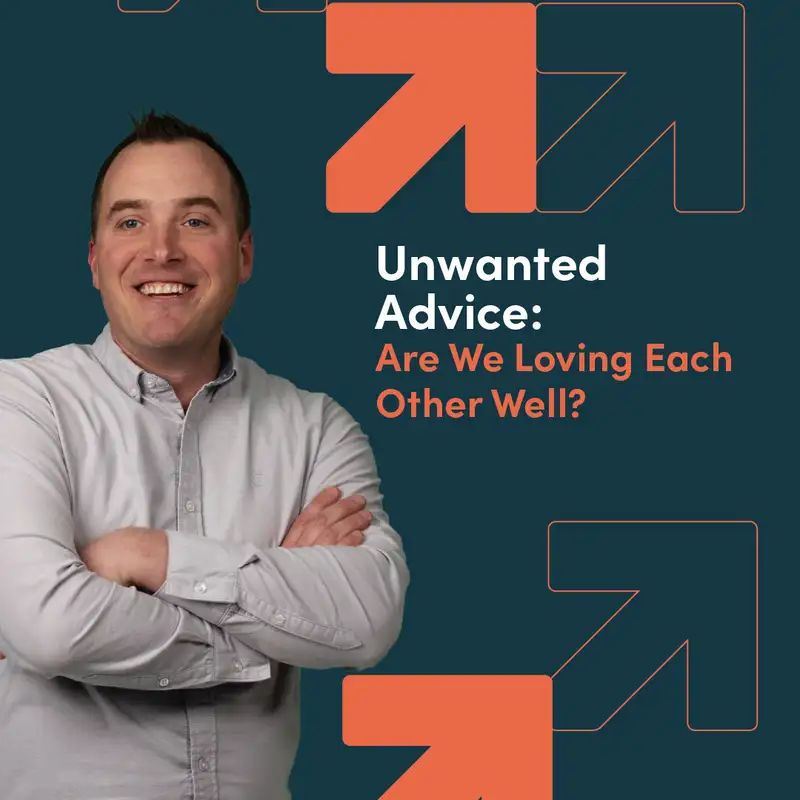Unwanted Advice: Are We Loving Each Other Well?
Hello, everyone. Thanks for listening to Wake Up, Look Up, a podcast where we connect events happening in real time to the gospel of Jesus Christ.
I'm Zach Weihrauch. And in today's episode, we're talking about unwanted advice. And we're asking the question, are we loving each other well?
This is prompted by an opinion piece I read in the New York Times. And it basically was making this argument. One of the most unkind things we do to each other, and we all do it, is give unwanted advice.
We respond when someone tells us about something they're struggling with, a negative experience they've had, something that's causing them stress or distress.
We respond by telling them what we would do or what they should do or how we handled a similar situation.
And when we do that, all the studies show we're hurting the other person. We're minimizing their feelings, minimizing their experience, and making ourselves feel the center of the story.
In fact, we're saying that our experiences are actually more important or more relevant than their needs.
And so the article was actually saying that one of the most loving things you can do if you can't resist the impulse just completely is to ask, do you want advice?
To give the other person a chance to go, actually, no, I'm just venting. Or no, I'm not really in the mood for that. Or even to say yes, but then receive what they asked for, no more or no less.
Advice without invitation can backfire. It's self-serving, it's ignoring them, especially when we're dealing with complicated situations they've spent all day wrestling through.
Now, the reason I'm covering this is two things. One is I need to get better at this. And two, I really need you to get better at this. And what I mean by that This is a pet peeve of mine.
It's something that I feel is very unloving. And when we talk as Christians about loving our neighbors, I think sometimes we stay theoretical with that.
We don't get down in the weeds of what does it actually mean to love each other? And I think one of the most practical ways we can do that is to stop giving unwanted advice.
So let me argue a theology of why loving each other probably means giving a little less advice. Let's start with this. In James chapter 1, James urges Christians to be quick to listen and slow to speak.
And that might be one of the most harmful things about giving unwanted advice. It can feel like, I'm not really sure you were listening to hear what I'm saying or how I'm feeling.
You were just listening to get to what you wanted to say. It almost makes you feel like halfway into your explanation of how your day went, they started forming an argument.
They weren't listening to you. They were just ready to show you how brilliant they are. And James tells us, hey, look, love looks like this. It listens well. It even restates, hey, it sounds like that was really hard.
It sounds like you're really struggling. How can I be there for you? How can I help? That's the posture of a listener. The second thing is this, respecting boundaries is a way of honoring each other.
Romans 12:10, Paul says to outdo each other in showing honor. That means actually ascribing respect to the person in a difficult situation, wisdom, kindness, patience.
Their problem isn't that they lack those things and you have those things in spades, which I'm not saying you believe, but when you jump straight to advice, that is what you're saying.
Hey, you couldn't possibly have figured this out. Let me tell you how to do it. You're not great at doing this, but I am. Let me share my brilliance with you. And Paul says, don't do that.
Honor each other. See the good in each other. The third thing is this, wisdom, real wisdom is timely. Proverbs 25, 11 says, a word fitly spoken is like apples of gold.
It's no different than just thinking about it this way. The right word in the right time makes a big impact, but the right word in the wrong time at best accomplishes nothing.
No one's saying we don't need to help each other by giving advice, but there's a time and a place for it.
And what the article was saying is when you ask the question, do you want advice? You're asking them, will this be a rotten apple for you or an apple of gold?
And what you're really saying is I only want to give you something that is helpful. And of course, the last thing is this. Empathy reflects Christ's example. In Hebrews chapter four, we're told we have a high priest who is able to sympathize with our weaknesses.
We don't have a high priest who instantly jumps to advice. Do you realize what that's saying? When you go to Jesus in prayer with a difficult situation, his first move is sympathy, not advice.
And he's the son of God. So if he responds to the distress of my day or of yours with empathy first and wisdom second, then how much more so those of us who don't exactly have his intellectual power.
Listen, let me issue a challenge to you today. Love people well. Listen well. Empathize well. And ask, do you want advice? And if I could be so bold, better yet, don't even ask.
Just love them. Honor them. Listen to them. Validate their feelings. And wait for the moment when you can actually be helpful.
Hey, thanks for watching this episode of Wake Up, Look Up. If you enjoyed it, please help us get the word out by sharing it with someone you think might benefit from it. And, while you’re here, make sure to subscribe to our YouTube channel to get further content or even download the CCC app where you'll find even more resources to help you grow in your faith and relationship with Jesus Christ.
Creators and Guests


